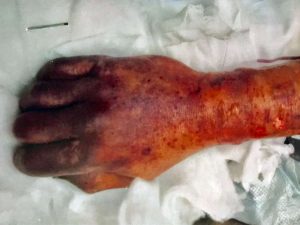A 63-year-old man from Germany has died because of a rare infection traced back to a lick from his dog.

“Pet owners with flu-like symptoms should urgently seek medical advice when their symptoms exceed those of a simple viral infection, which in this case were severe dyspnoea and petechiae.
The disease contracted by the man, who was admitted to Red Cross Hospital in Bremen, Germany, was due to the bacterium capnocytophaga canimorsus. It’s found most commonly in the mouths of cats and dogs, and is transmitted to humans in rare cases, usually through an animal bite.
The most susceptible are those who suffer from immunodeficiency, splenectomy or alcohol abuse, but the report notes that the patient didn’t suffer from those conditions.
In this case, the man had also not been bitten.
Instead, he was only licked by his pet during the weeks before he was admitted to the hospital.
When the man arrived at the Red Cross Hospital, he reported severe symptoms for three days, such as an elevated temperature and difficulty breathing (dyspnoea). The day before, a rash had also appeared on his face (petechiae), to go along with nerve and muscle pain in his legs, which was the cause of subcutaneous bleeding. The patient also had a kidney injury, liver dysfunction, hypoxia, lack of blood flow to the muscles and wasn’t urinating.
Without a headache or neck stiffness, the medical team couldn’t diagnose meningitis. But it did diagnose him with sepsis, a blood infection, and purpura fulminans, which is a blood clotting disorder that leads to skin discoloration.
Despite various antibiotics, his symptoms continued to grow worse, leading to a cardiac arrest. He was resuscitated and then intubated.
Doctors were able to identify the cause of the illness on the fourth day in care. But even with adjusted treatment, his condition grew worse, leading to multiple organ failures, as well as pneumonia. After 16 days of treatment, the patient died from multiple organ failures, according to the report.
Similar cases have recently been seen in the States.
In Ohio, a woman had her hands and legs amputated after being infected by the same bacteria. It occurred after her dog licked an open cut.
In Wisconsin, part of a man’s nose, to go along with both his hands and feet had to be amputated after contracting the same bacteria.
The report notes that capnocytophaga canimorsus is fatal in approximately 25 per cent of patients, but that the high statistic might be an inaccurate reflection of the real world, because of a limited body of research.
“Physicians confronted with such patients should ask about contact with dogs and cats,” the authors suggested to other medical practitioners.




Leave a Reply
You must be logged in to post a comment.